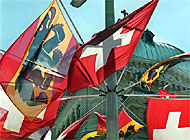Ministers stress openness and solidarity on national day

In their national day speeches, Swiss ministers have called for the country to play a bigger role in the world, while still preserving Switzerland's traditions of community and democracy.
The president, Adolf Ogi, said it was time for Switzerland to join the United Nations.
Standing on what he called the “balcony of Switzerland” in Crans-Montana in canton Valais, Ogi said he wanted the country to play a decisive role in world politics. He said it was no longer enough for Switzerland to show solidarity with the international community, it must become actively involved.
For this reason, he said, the government supported Swiss membership of the United Nations. He had a similar message about relations with the European Union, saying the country had to go further than simply voting “yes” to a series of bilateral accords with the EU.
Ogi said it was possible to be Swiss and to be open to the outside world at the same time. He said the country had a strong democratic and federal tradition and was ready to face the challenges ahead.
It was at the Rütli meadow in canton Schwyz on August 1, 1291 that the Swiss confederation was born, and it was here that the finance minister, Kaspar Villiger, chose to deliver his national day address.
However, a volley of boos and whistles coming from a group of some 150 right-wing extremists marred Villiger’s speech. “We are the opposition,” they shouted.
In the early hours, a group, identifying itself as the Revolutionary Clandestine Armed Faction Etc. – and by the French-language acronym FARCE – replaced the Swiss flag at the site with that of the European Union.
In a statement, it declared the meadow the “free territory of the European Union.” Police removed the flag in time for the minister’s speech.
Speaking close to the site where the elders of Uri, Schwyz and Unterwalden swore their oaths to the confederation, Villiger warned against the dangers of individualism, saying the growing tendency to put one’s own interests before those of the community was a threat to Swiss solidarity.
On the subject of globalisation, Villiger was forthright, saying that in their frenzy to “restructure”, business leaders were forgetting that they are dealing with the fate of flesh and blood human beings. He added that globalisation was subjugating both business and government.
In his address in Fribourg, the foreign minister, Joseph Deiss, echoed the words of Adolf Ogi. He urged the country to join the United Nations, saying it had to emerge from its self-imposed isolation and live up to its international responsibilities.
He said in today’s world, decisions often had implications far beyond national borders, and therefore it was necessary for Switzerland “to assume a political presence on the international stage”.
On the subject of Europe, Deiss said Switzerland was now firmly on the road to closer ties with the European Union, following the approval of seven bilateral accords by Swiss voters last May. He added that Switzerland would now be able to influence the destiny of Europe, which was vital for the national interest.
swissinfo with agencies

In compliance with the JTI standards
More: SWI swissinfo.ch certified by the Journalism Trust Initiative
You can find an overview of ongoing debates with our journalists here . Please join us!
If you want to start a conversation about a topic raised in this article or want to report factual errors, email us at english@swissinfo.ch.